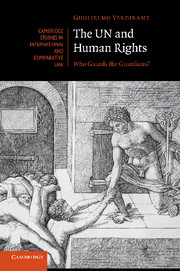Book contents
- Frontmatter
- Contents
- Foreword
- Acknowledgements
- Abbreviations
- Table of cases (international)
- Table of cases (national)
- Table of legal instruments
- Introduction
- 1 Concepts and definitions
- 2 Human rights obligations of international organisations
- 3 International institutional responsibility
- 4 UN relief and development operations
- 5 UN peacekeeping operations
- 6 International administrations
- 7 Implementation of UN sanctions
- 8 Accountability
- Conclusions
- Bibliography
- Index
- References
2 - Human rights obligations of international organisations
Published online by Cambridge University Press: 07 October 2011
- Frontmatter
- Contents
- Foreword
- Acknowledgements
- Abbreviations
- Table of cases (international)
- Table of cases (national)
- Table of legal instruments
- Introduction
- 1 Concepts and definitions
- 2 Human rights obligations of international organisations
- 3 International institutional responsibility
- 4 UN relief and development operations
- 5 UN peacekeeping operations
- 6 International administrations
- 7 Implementation of UN sanctions
- 8 Accountability
- Conclusions
- Bibliography
- Index
- References
Summary
Introduction
In the vast literature on international institutional law, discussions of the obligations of international organisations have been sporadic. Some authors have examined the human rights obligations of non-state actors, but these analyses have not normally offered general insight into the creation of obligations for international organisations. The extensive scholarship on the legal personality of international organisations tends to concentrate on their rights and omits to analyse their duties. And, as for the ILC’s work on the responsibility of international organisations, this deals with secondary rules and touches on the obligations of international organisations only peripherally. All in all, this area remains largely uncharted.
Any analysis of obligations in international law must begin with a reference to Article 38 of the Statute of the ICJ, which, on its face, deals only with the law to be applied by the Court in deciding disputes between states, but is widely regarded as the most authoritative statement on the sources of international law. In a formal sense, the source of any obligation binding an international organisation will be one of those enumerated in Article 38 – treaty, custom, general principles, judicial decisions or academic writings – but a merely formal approach to this topic will not take us very far. Doubtless, international organisations, like states, will be bound by obligations arising under treaties to which they are parties, but what about constituent instruments? International organisations are not, technically, parties to them. Yet, it is generally accepted that constituent instruments may be a source of international legal obligations for organisations. It is not entirely clear, however, how obligations are to be distilled from such instruments. Furthermore, international organisations have not generally become parties to the multilateral treaties through which much international law-making has taken place in recent decades, especially in the area of human rights. Does this mean that international organisations are not bound by those principles and rules? That they are, in a human rights sense, actors legibus soluti?
- Type
- Chapter
- Information
- The UN and Human RightsWho Guards the Guardians?, pp. 55 - 90Publisher: Cambridge University PressPrint publication year: 2011



